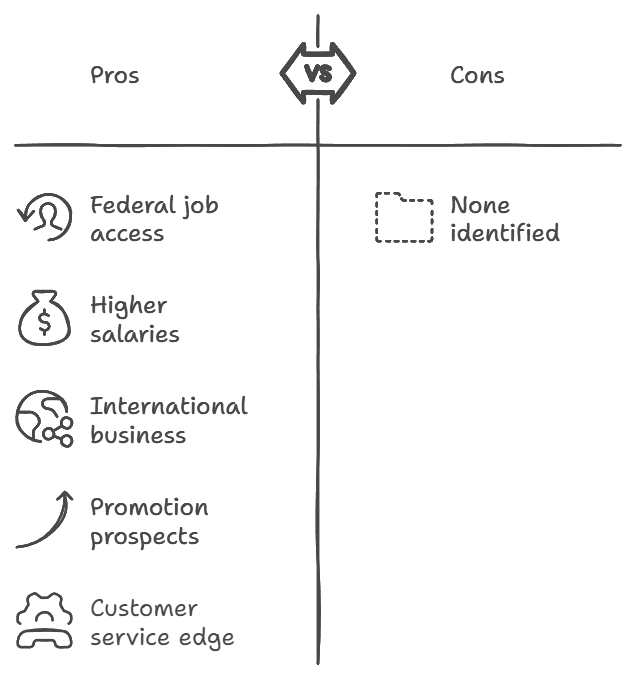Is Learning French Useful in Canada? A Comprehensive Guide for 2024
Yes, learning French is incredibly useful in Canada, offering significant advantages in employment, immigration, and social integration. As one of Canada’s official languages, French proficiency can open doors to better job opportunities, higher salaries, and enhanced cultural experiences across the country.
Key Takeaways
- French speakers earn 5-15% higher salaries on average
- Bilingual candidates receive up to 50 extra points in Express Entry
- 85% of government positions require French proficiency
- French speakers have access to unique immigration streams
- Bilingual professionals have 30% more job opportunities
The Official Language Landscape
French holds a special place in Canadian society, with over 22% of Canadians speaking French as their first or second language. While Quebec remains the primary French-speaking province, significant Francophone communities exist across the country, particularly in New Brunswick, Ontario, and Manitoba.
Regional French Usage Distribution
| Province/Territory | French Speakers (%) | Official Status |
|---|---|---|
| Quebec | 94.5% | Primary |
| New Brunswick | 31.8% | Co-official |
| Ontario | 11.5% | Select regions |
| Manitoba | 8.7% | Select services |
| Nova Scotia | 3.2% | Select services |
Professional Advantages
The demand for French-speaking professionals continues to grow across various sectors. Government positions often require bilingualism, offering a “bilingualism bonus” of up to $800 annually. In the private sector, French speakers typically earn 5-15% more than their monolingual counterparts.
Career Benefits:
- Access to federal government positions
- Higher starting salaries
- International business opportunities
- Enhanced promotion prospects
- Competitive advantage in customer service roles

Immigration Benefits
French proficiency can significantly boost immigration prospects. The Express Entry system awards additional points for French language skills:
- Basic French (CLB 7): 25 points
- Advanced French (CLB 9): 50 points
- Both English and French: Up to 75 bonus points
Educational Pathways
Canada offers various French learning options to suit different needs and schedules. The success rate for achieving professional fluency varies by program:
Program Comparison
| Program Type | Duration | Success Rate | Cost Range (CAD) |
|---|---|---|---|
| Immersion | 6-12 months | 85% | $8,000-15,000 |
| Core French | 12-24 months | 65% | $3,000-6,000 |
| Online Learning | Self-paced | 45% | $500-2,000 |
Government Support and Initiatives
The Action Plan for Official Languages 2023-2028 provides substantial support for French learners:
- $4,000 training allowance for eligible candidates
- Free online learning resources
- Subsidized immersion programs
- Community integration support
Cultural Integration
Learning French extends beyond professional benefits. It opens doors to:
- Francophone media and entertainment
- Cultural festivals and events
- Local community groups
- French-language theater and arts
- Bilingual social networks
Economic Impact
The economic advantages of French proficiency are substantial. Recent studies show that bilingual employees in Canada’s private sector earn an average of 12.6% more than monolingual workers.
Industry-Specific Advantages:
- Technology: 15% higher starting salaries
- Customer Service: 10% premium on hourly rates
- Healthcare: 8% higher annual compensation
- Education: Additional qualification pay
- Tourism: Enhanced employment opportunities
Future Outlook
The demand for French speakers in Canada continues to grow. By 2025, experts predict:
- 20% increase in bilingual job postings
- Higher immigration quotas for French speakers
- Expanded French services across provinces
- Growing investment in French-language industries
Practical Tips for Success
To maximize the benefits of learning French in Canada:
- Start with government-recognized language tests
- Join local French-speaking communities
- Utilize free government resources
- Consider immersion programs
- Practice with native speakers
Remember, French proficiency is more than just a skill in Canada—it’s an investment in your future. Whether you’re planning to immigrate, advance your career, or enrich your cultural experience, learning French can significantly enhance your opportunities in the Canadian landscape.
The value of French in Canada extends beyond simple bilingualism. It’s a gateway to better job prospects, smoother immigration processes, and richer cultural experiences. With government support and various learning options available, there’s never been a better time to start learning French in Canada.
